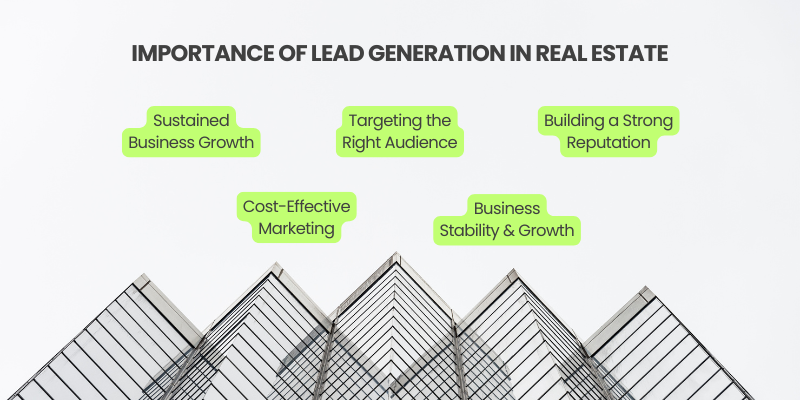Lead generation is the cornerstone of a successful real estate business. In a competitive and ever-evolving market, realtors need to constantly adapt their strategies to attract high-quality leads.
The importance of lead generation cannot be overstated, as it directly impacts a realtor's ability to close deals and build lasting relationships with clients.
Whether you’re a seasoned professional or new to the industry, mastering the Best Lead Generation For Realtors is essential for achieving consistent business growth and long-term success.
The Traditional methods like cold calling and door knocking are no longer as effective as they once were. With the rise of social media, search engines, and automation, real estate professionals now have more tools than ever to connect with potential buyers and sellers.
However, navigating through these tools and strategies can be daunting for many realtors.
This article will break down the most effective lead generation methods for realtors, focusing on both modern and time-tested strategies that can yield high-quality leads and ensure sustainable business growth.
Understanding Lead Generation in Real Estate
In the real estate industry, lead generation refers to the process of attracting and identifying potential clients who are interested in buying or selling property.

It involves various methods of reaching out to individuals or groups, nurturing those connections, and ultimately converting them into clients.
For realtors, lead generation is vital to keeping a steady stream of opportunities coming their way, ensuring business growth and success. High ticket affiliate marketing is one such method where agents can leverage affiliate partnerships to generate substantial income from premium leads, which can significantly impact the real estate industry. Local search optimization services are also critical for targeting buyers and sellers in specific geographic areas, ensuring that listings appear in relevant searches
Lead generation is the process of identifying, attracting, and engaging potential clients, often referred to as "leads."
Lead generation can occur through various channels, such as online marketing, word-of-mouth referrals, advertisements, networking events, and more.
In the context of real estate, lead generation typically focuses on two groups:
- Buyers – Those looking to purchase properties.
- Sellers – Those wanting to sell their properties.
Effective lead generation strategies provide real estate professionals with the opportunity to find new prospects, build relationships, and expand their client base.
Importance of Lead Generation in Real Estate
Lead generation is the backbone of a successful real estate business. Without a steady stream of leads, real estate agents and firms would struggle to meet their sales goals.

The importance of lead generation can be broken down into several key points
1. Sustained Business Growth
A consistent flow of new leads ensures that agents always have potential clients to work with, maintaining a healthy pipeline of deals and opportunities.
2. Targeting the Right Audience
Through effective lead generation strategies, real estate professionals can identify individuals who are actively seeking to buy or sell properties, allowing agents to focus on the most promising prospects.
Even an oil and gas marketing agency and ecommerce SEO marketing agency uses similar principles in targeting their most relevant clients in a highly specialized market.
3. Building a Strong Reputation
Continuous engagement with leads helps establish a real estate agent as a knowledgeable and reliable professional. By offering valuable information, advice, and personalized services, agents can build trust with potential clients, making them more likely to convert.
4. Cost-Effective Marketing
Lead generation techniques, especially digital marketing, allow agents to target specific audiences and reduce wasted marketing spend. For example, advertising on social media platforms lets agents reach local clients who are more likely to engage.
5. Business Stability
For both new and seasoned agents, diversifying lead generation methods ensures that they are not reliant on just one source of prospects. By using multiple lead channels, such as social media, SEO, or referrals, agents can create more stable business growth.
3 Types of Leads (Cold, Warm, Hot)
Leads are often categorized based on their level of interest, intent, and readiness to engage in a transaction. Understanding these types is crucial because it helps real estate agents prioritize their time and resources effectively.
Using tools like SEO ranking report software can help agents identify where their listings or website are ranking for relevant search terms, ensuring that they are targeting the right leads.
1. Cold Leads
These are leads that have shown little to no interest in making a purchase or sale. Cold leads typically have not interacted significantly with the realtor and may be unaware of their services or offerings.
2. Warm Leads
These leads are in the middle ground they have shown some level of interest and are likely considering their options. They may have interacted with the realtor in some way, like attending an open house, downloading a home-buying guide, or responding to an email inquiry.
3. Hot Leads
Hot leads are individuals who are actively ready to make a buying or selling decision. They are highly engaged, have expressed strong intent, and are often looking for a realtor to help them complete a transaction.
Explore Our Real Estate Marketing Agency!
3 Traditional Lead Generation Methods
While digital marketing has become the dominant force in real estate lead generation, traditional methods still play a crucial role in building a client base.
These methods, while more time-consuming and sometimes less measurable than digital strategies, can still be effective in creating personal connections, building trust, and reaching potential clients who might not be as active online.
Let's explore some of the most common traditional lead generation methods for realtors.
1. Cold Calling
Historically, cold calling was a primary method for generating leads. While it's still in use today, its effectiveness has declined due to consumer resistance and the rise of digital tools.
Realtors need to ensure they’re using the most relevant and respectful methods to approach potential clients.
2. Door Knocking
Door knocking used to be a popular method, particularly in specific neighborhoods or for finding sellers. However, in the digital age, people are often less receptive to face-to-face solicitation, which makes this method less effective.
3. Print Advertising
Flyers, postcards, and newspaper ads were once staples in real estate lead generation. However, with the digital shift, the ROI on these methods has diminished as consumers increasingly rely on the internet to find information.
Why Traditional Lead Generation Methods Are Losing Effectiveness?
While traditional lead generation methods have been integral to the real estate industry, they are gradually losing their effectiveness in today’s digital age.
Consumers’ behaviors and expectations are evolving, and these methods are often seen as intrusive or outdated.
Modern consumers are more inclined to research properties and agents online rather than engage in unsolicited phone calls or face-to-face visits.
Organic SEO services have become a crucial strategy for real estate professionals looking to attract traffic without relying on paid ads.
A noindex tag on certain pages can help control which content gets indexed by search engines, ensuring that only relevant content is searchable, which is critical when real estate businesses refine their online strategies.
Tools like automated chatbots, email campaigns, and targeted digital ads have become preferred methods for initial contact, as they offer more control and convenience for the consumer.
Traditional print media is losing its reach, as more people consume information online.
Unlike digital ads, print ads are not easily targeted to specific demographics or interests.
4 Effective Digital Lead Generation Strategies for Realtors
Effective digital lead generation strategies for realtors involve leveraging tools like social media marketing, SEO, email campaigns, content creation, and automation to attract and convert high-quality leads.

Real estate agents often use paid search ads to target specific audiences, ensuring they reach the most relevant leads. It's important to understand what is network marketing as a strategy, especially for agents who want to expand their reach through referral programs or partnerships.
Additionally, the Google Ads cost can vary, and understanding how Shopify works may help you leverage eCommerce platforms for supplementary real estate-related services.
1. Social Media Marketing (Facebook, Instagram, LinkedIn)
Social media is one of the most powerful tools for real estate lead generation. Platforms like Facebook, Instagram, and LinkedIn allow realtors to connect with a large audience, post property listings, share valuable content, and engage directly with prospects.
Paid ads on these platforms can target specific demographics, increasing the chances of reaching qualified leads.
- Facebook Ads: Create hyper-targeted ads for specific neighborhoods or buyer personas.
- Instagram Stories and Posts: Share visually appealing photos and videos of listings to attract attention.
- LinkedIn: Network with professionals in your area and position yourself as an expert in the real estate field.
Pros:
✅ High Reach & Engagement: Access to millions of potential clients across platforms.
✅ Targeted Advertising: Advanced audience targeting by demographics, interests, and location.
✅ Visual Appeal: Ideal for showcasing listings through images, videos, and virtual tours.
✅ Brand Building: Enhances your online presence and builds trust with consistent posting.
✅ Direct Interaction: Allows instant messaging and engagement with leads.
Cons:
❌ Requires Consistency: Regular posting and engagement are time-consuming.
❌ Paid Ads Can Be Costly: Competitive markets can increase ad costs quickly.
❌ Algorithm Changes: Sudden changes can reduce organic reach.
❌ Difficult to Measure ROI: Brand awareness is easier to track than direct conversions.
Explore Our Digital Marketing Services!
2. Search Engine Optimization (SEO) for Realtors
SEO is Important for attracting organic traffic to your website and generating leads. By optimizing your website and content, you can rank higher in search engine results, making it easier for potential clients to find you when they search for real estate information. For best results, ensure your site is responsive and optimized across all devices, a standard practice in Mobile Design & development services, which ensures a seamless experience for users on smartphones and tablets.
- On-page SEO: Optimizing your website’s content with relevant keywords (e.g., "homes for sale in [location]") will increase visibility in search engines.
- Local SEO: Ensure that your business is listed on Google My Business and other local directories, which helps you attract leads in your target geographic area.
Pros:
✅ Long-Term Results: Once established, SEO can drive consistent organic traffic.
✅ High-Quality Leads: Users actively searching for real estate are often ready to act.
✅ Cost-Effective Over Time: No per-click cost once you rank well.
✅ Builds Credibility: Ranking high in search results improves trust and authority.
✅ Supports Local Visibility: Local SEO helps attract clients in your specific area.
Cons:
❌ Takes Time: Results can take 3–6 months or longer to show.
❌ Requires Technical Expertise: On-page, off-page, and technical SEO can be complex.
❌ Constant Updates Needed: Search algorithms and competitor activity change frequently.
❌ Content Creation Demand: Success depends on regular, optimized content publishing.
Explore Our Search Optimization Services!
3. Email Marketing
Email remains one of the most effective ways to nurture leads and stay top of mind with potential clients.
By sending personalized emails, newsletters, and property updates, you can build relationships with leads and move them closer to conversion.
- Automated Email Campaigns: Create automated sequences to follow up with leads at different stages of their buying or selling journey.
- Property Listings and Market Updates: Regularly send relevant property listings or market updates to your subscribers to keep them engaged.
Pros:
✅ Personalized Communication: Allows targeted, one-on-one messaging.
✅ High ROI: One of the most cost-effective digital marketing channels.
✅ Automation Friendly: You can nurture leads with minimal manual effort after setup.
✅ Keeps You Top-of-Mind: Regular updates remind leads of your services.
✅ Trackable Performance: Open rates, click rates, and conversions are measurable.
Cons:
❌ Requires a Strong Contact List: You must first capture email addresses effectively.
❌ Risk of Spam Filters: Poorly designed campaigns may end up in spam folders.
❌ Content Fatigue: Subscribers may unsubscribe if emails are too frequent or irrelevant.
❌ Initial Setup Time: Crafting templates and automation sequences requires effort.
Explore Our Email Marketing Services!
4. Content Marketing and Lead Magnets
Content marketing and lead magnets involve creating valuable content, such as blog posts, e-books, or webinars, to attract and engage potential clients while offering free resources in exchange for their contact information. Additionally, understanding what is the digital marketing strategy that tracks users across the web? can be useful when you want to create highly personalized content based on user behavior and interests.
- Creating Valuable Content: By producing valuable, informative content, such as blog posts, videos, or infographics, you can attract leads who are interested in learning more about the market and the process of buying or selling a home.
- Blogging: Share market insights, tips for buyers and sellers, and neighborhood guides to attract potential leads.
- Video Marketing: Virtual tours, client testimonials, and informative videos can help establish trust and engage your audience.
- Lead Magnets: Lead magnets are tools that incentivize potential clients to provide their contact information. These can be downloadable resources, such as e-books, market reports, or home valuation tools. Once a lead provides their information, you can nurture them through targeted email campaigns.
Pros:
✅ Builds Authority & Trust: High-quality content positions you as an expert.
✅ Attracts Organic Leads: Valuable content drives inbound traffic.
✅ Supports Other Channels: Boosts SEO, social media engagement, and email campaigns.
✅ Lead Qualification: Lead magnets attract genuinely interested prospects.
✅ Evergreen Value: Well-made content can generate leads for months or years.
Cons:
❌ Time-Intensive: Researching, writing, and producing quality content takes effort.
❌ Delayed Results: Like SEO, it takes time to see measurable outcomes.
❌ Needs Promotion: Content won’t perform without distribution (social, ads, email).
❌ Competition: Many realtors produce similar content, differentiation is key.
Explore Our Content Marketing Services!
Comparison Table: Digital Lead Generation Strategies for Realtors
| Strategy | Best For | Estimated Cost | Speed of Results | Main Challenges |
|---|---|---|---|---|
| Social Media Marketing (Facebook, Instagram, LinkedIn) | Building brand visibility, engagement, and targeting local audiences | 💲💲 (Medium – Ad spend + content creation) | ⚡ Fast (1–4 weeks) | Requires consistent posting; ad costs can rise; algorithm changes affect reach |
| Search Engine Optimization (SEO) | Long-term organic traffic and credibility | 💲💲💲 (Medium–High – content & technical optimization) | 🕓 Slow (3–6 months) | Time-consuming; needs ongoing optimization; algorithm updates impact ranking |
| Email Marketing | Nurturing leads and staying top-of-mind | 💲 (Low – email software + content creation) | ⚡ Medium (2–6 weeks) | Requires building a quality list; spam risk; content must remain relevant |
| Content Marketing & Lead Magnets | Establishing authority and attracting qualified leads | 💲💲💲 (Medium–High – writing, video, and design costs) | 🕓 Slow (2–6 months) | Time and resource intensive; results take time; requires ongoing promotion |
Using CRM and Automation for Lead Nurturing
Using CRM and automation for lead nurturing involves leveraging software tools to manage and track leads, automate follow-ups, and deliver personalized communication to build relationships and guide leads through the sales funnel.

1. Customer Relationship Management (CRM) Systems
A CRM helps realtors organize, manage, and track leads throughout the sales process. By storing lead information in one place, CRMs make it easier to follow up with leads, assign tasks, and track interactions.
2. Lead Nurturing with Automation
Automation tools can help realtors stay in touch with leads without manual intervention. Using automated email sequences and follow-up reminders ensures that no lead falls through the cracks.
Leveraging Referrals and Networking
Leveraging referrals and networking involves building strong relationships with past clients, industry professionals, and local businesses to generate word-of-mouth leads and expand your client base through trusted recommendations. Real estate agents may also engage in B2B vs B2C marketing when working with other businesses, like contractors or mortgage brokers, or directly with consumers.
1. Building Relationships with Past Clients
Referrals are one of the most effective ways to generate new leads. Providing exceptional service and maintaining relationships with past clients can encourage them to refer friends, family, or colleagues to you.
2. Networking with Local Professionals
Partnering with mortgage brokers, attorneys, or contractors can help you gain referrals and expand your network. Co-marketing with these professionals allows both parties to tap into each other’s networks.
Measuring and Analyzing Lead Generation Efforts
Measuring and analyzing lead generation efforts involves tracking key performance indicators (KPIs), such as conversion rates and lead sources, to assess the effectiveness of strategies and optimize future marketing efforts.
To stay ahead of the competition, real estate agents should consider using the best SEO tools for small businesses to track and optimize their websites. By improving local SEO strategies, realtors can attract more relevant leads to their websites. This could be achieved through content creation or leveraging advertisement examples from successful competitors.
1. Key Performance Indicators (KPIs):
It’s important to track the success of your lead generation efforts to ensure that you’re getting the best return on investment (ROI). Common KPIs include lead conversion rates, website traffic, engagement rates on social media, and email open rates.
2. Analyzing Results
Use analytics tools to track which lead generation methods are most effective. For example, you can monitor Google Analytics to see which pages attract the most traffic or track Facebook ads to understand the cost-per-lead.
3 Common Mistakes in Lead Generation and How to Avoid Them
Common mistakes in lead generation include neglecting lead nurturing, focusing on quantity over quality, and ignoring local SEO, all of which can be avoided by prioritizing targeted strategies, consistent follow-ups, and optimizing for relevant search terms. Agents should also learn what is B2B marketing and apply these principles when networking with other businesses or professionals who can provide useful referrals.
1. Overlooking Lead Nurturing
Generating leads is only half the battle. Many realtors focus too much on lead acquisition and fail to nurture them through follow-up emails, calls, and personalized interactions.
t's crucial to understand what is illustration in this context, as it helps agents visualize the process of nurturing leads and developing relationships over time.
2. Chasing Too Many Leads
Focusing on quantity over quality can lead to wasted resources. It’s important tofocus on attracting qualified leads who are ready to buy or sell.
3. Neglecting Local SEO
Local SEO is essential for realtors, as most clients are looking for properties in specific geographic areas. Not optimizing for local search can result in missing out on key leads in your area.
Top 8 Real Estate Lead Generation Websites in 2025
In 2025, real estate professionals have the access to a variety of advanced lead generation platforms that leverage technology to connect agents with high-quality leads.
These platforms offer tools for targeted marketing, automated follow-ups, and comprehensive CRM systems to streamline the lead generation process.
Additionally, when navigating these platforms and their large databases, knowing how to search for words on a page can greatly improve efficiency in finding the most relevant information quickly. Here are some of the top real estate lead generation platforms in 2025.
Here are some of the top real estate lead generation platforms in 2025
1. Zillow Premier Agent
Connects real estate professionals with high-intent buyers and sellers through Zillow's vast network, offering exclusive ZIP code territories for lead ownership, a comprehensive dashboard for lead management, and integration with Zillow's property listings for increased visibility.
2. Realtor.com Connections Plus
Provides verified buyer and seller leads directly from Realtor.com users, featuring exclusive leads with verified contact information, advanced CRM integration, and a mobile-friendly platform for on-the-go lead tracking.
3. Market Leader
Offers a full-service marketing suite with exclusive leads, customizable IDX websites, and automated lead nurturing and follow-up campaigns.
For those interested in understanding what are five marketing strategies that retailers spend half of their annual budget on?, Market Leader provides a comprehensive overview of the most effective strategies for businesses looking to maximize their marketing investments.
4. Zurple
Specializes in automated lead nurturing, utilizing behavioral data for email and text campaigns tailored to lead activity, with real-time alerts and CRM integration.
5. Real Geeks
Provides an all-in-one, cost-effective lead generation solution with customizable lead capture websites, automated email campaigns, and CRM integration for lead management and tracking.
6. CINC (Commissions Inc.)
Offers geo-targeted lead generation with advanced lead routing and distribution, integrated CRM with task automation, and customizable marketing campaigns designed for teams needing scalability and the kind of customization commonly provided by web app development services in real estate tech platforms.
7. Ylopo
Uses AI-powered tools for lead generation and conversion, providing AI-driven ad targeting, automated follow-up, and integration with popular CRM platforms.
8. Catalyze AI
Focuses on generating leads for inherited property sellers through predictive analytics, automated outreach, and CRM integration for lead management.
FAQs: Best Lead Generation For Realtors
What is the best lead generation for realtors in 2025?
The best lead generation for realtors in 2025 combines digital strategies such as SEO, social media marketing, and automation. Realtors using platforms like Zillow Premier Agent, Realtor.com Connections Plus, and Ylopo can attract high-quality leads while maintaining consistent engagement through email campaigns and CRM systems.
How can real estate agents find the best leads for real estate agents?
To find the best leads for real estate agents, focus on targeted marketing through local SEO, Facebook and Instagram ads, and high-value content like home guides or neighborhood reports. Using analytics tools helps agents identify which channels generate the most qualified buyers and sellers.
What makes a system the best lead generation system for realtors?
The best lead generation system for realtors integrates CRM tools, automation, and predictive analytics to manage and nurture leads effectively. Systems like CINC, Real Geeks, and Market Leader offer end-to-end solutions that track, qualify, and convert leads seamlessly.
Where can agents get the best real estate leads for agents online?
Platforms such as Zillow Premier Agent, Realtor.com, and Catalyze AI provide the best real estate leads for agents by offering verified, high-intent contacts. These platforms use data-driven targeting and automated follow-ups to help agents connect with serious buyers and sellers quickly.
What strategies help real estate leads agents convert more prospects?
Successful real estate leads agents use personalized email nurturing, social proof (such as testimonials), and video marketing to convert leads. Combining automation with personal engagement ensures that leads remain warm and progress smoothly toward a transaction.
6. How does real estate B2B lead generation benefit realtors?
Real estate B2B lead generation helps realtors build partnerships with mortgage brokers, contractors, and developers to generate referral-based leads. These business-to-business relationships create a steady pipeline of clients and strengthen credibility in the local market.
Conclusion
Lead generation is an ongoing process that requires continuous refinement and adaptation. By embracing modern strategies such as digital marketing, SEO, content creation, and automation, realtors can stay competitive and attract high-quality leads.
Remember, lead generation isn’t just about quantity; it’s about cultivating relationships and providing value to your audience.
By using the right tools and techniques, realtors can ensure long-term success and sustainable business growth in today’s dynamic market.
In a fast-paced industry where competition is fierce, mastering the Best Lead Generation For Realtors ensures you stay ahead, generate consistent opportunities, and turn prospects into loyal, satisfied clients.
By staying current with the latest trends and strategies, realtors can continue to thrive in a competitive marketplace.









